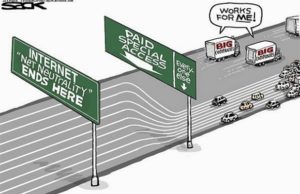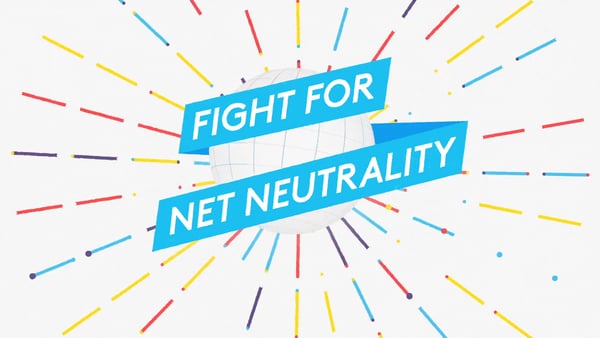It is no secret that our society today is run by the internet and on the internet. Just about everyone will use the internet in some form at least once a day, and a large part of our economy is dependent on the internet. Some of the largest corporations, like Amazon and Google, make upwards of $2,000 and $3,000 per second on the internet. There are numerous stores that function solely online and people who live off of the earnings from paid sponsorships on Instagram and YouTube.
Thanks to the 2015 Federal Communication Commission (FCC) ruling establishing net neutrality, the internet is free, and our society was shaped by this. Under this ruling, internet service providers (ISPs) treated all content equally, didn’t give preference to any providers or content and were not allowed to block content, letting consumers see the internet for what it really was, free of bias from internet providers.
When net neutrality was first introduced, there was much debate that boiled down to whether the internet is open or neutral, or both. To answer the question, the internet has always been open, because anyone can use it, but the internet has not always been neutral. The neutrality of the internet deals with ISPs and the regulation that they bring to the table.
Net neutrality made sure that there was no preferential speed for certain apps or content, which means that all data, no matter the app, is delivered to consumers at the same rate. ISPs didn’t support this because it cost them more money to provide the correct bandwidth for equal speeds.
When consumers use multiple applications, or are on multiple websites at the same time, this creates a need for more bandwidth, and your ISPs want you to cover the cost of the extra bandwidth. Net neutrality said that this isn’t neutral, and didn’t allow it. So, since February of 2015, the United States has enjoyed free internet.

Talk of repealing net neutrality was started by FCC Chairman Ajit Pai, and on Dec. 11, the motion to repeal net neutrality was approved by Pai and two other Republican chairmen, giving then a 3-to-2 majority.
Pai and supporters claim that getting rid of net neutrality will eventually benefit consumers because providers will have to compete for a customer’s business, but at the end of the day, consumers will still have to pay for the services they want.
Many are solely concerned about this; they’re concerned about paying for their social media, but the consequences strike a lot deeper than just social media. By abolishing net neutrality, consumers will have to pay for the apps they want, and ISPs can actually sway what they see. ISPs can choose which apps to provide, and at what speeds they’re available at. If your ISP wants to push a specific app, they can boost the speed of the app, while lessening the speed of others. For example, apps like Netflix and Hulu are likely to be slowed because they create competition for cable companies that are also ISPs, like Time Warner Cable.

The number of things that will suffer due to this ruling grows and grows the longer you think about it, starting with innovation. Innovation is fostered by young minds and lives on the internet. So many steps into the future were made on the internet, either by being able to freely research on the internet, or gaining support for inventions through the free advertisement that social media provides.
Without the freedom to use the internet the way we have, our innovation will suffer. I know that I, as well as many other students, have heavily relied on Google to help get through assignments. And in college, the majority of assignments are source-based and due online. Though the internet won’t just disappear after this ruling being implemented, many students and families will not be able to afford to pay for their internet, so opportunities for those families are sacrificed.
The majority of news that reaches young and old is found online, and the presence of online news allows information to be shared faster and more accurately. If this ruling is implemented, your ISP can choose which news sites are provided, and which ones are preferred. This means that if your ISP has an established view, they can choose to only promote the news sources that have the same views as them. This means visibility for a spectrum of issues can disappear. So issues that affect the LGBTQ+ community, people of color, and police brutality can cease to be talked about. We can hope that ISPs don’t do this and maintain what little equality we have for news coverage, but in reality, they can do what they want, and consumers are at their mercy.
And though social media isn’t at the top of the list for serious negative consequences, social media and social media users will suffer. Many, many people make their living off of social media, like famous YouTubers and influencers, such as Zoe Sugg, Christine Sydelko, and Michelle Phan. Even beyond those creators, there are advertising agencies and social media managing companies that rely on the activity of consumers on social media. By regulating and making people pay for internet, many users will cease to use social media (whether by choice or because they have no choice), and the need for social media managers and online ads will lessen. This will put people out of jobs and mean that influencers will not be able to live off of their online presence.

Also, social media and the internet has made connecting incredibly easy. I’ve made some of my best friends online, and I’m not the only one. Many teens and young adults have relied on social media sites in order to talk to and make friends, and this has boosted their mental health. Groups like the Trevor Project and the Buddy Project help advocate for the mental health of youth. These groups function mainly online and rely on the internet being accessible to anyone and everyone, so they can reach and help those at risk for suicide and self-harm.
In general, the negative consequences are many and the benefits are few. Luckily, there is still time to fight this, and you can and should get involved, because this involves you. You can text “resist” to 50409, or “BATTLE” to 384-387 to contact your elected officials, but the most effective way to resist is to call your congressmen, your representatives.
For more information, visit https://act.freepress.net/call/internet_nn_call_congress/. They, and many other sites give you step by step instructions and aid in helping you resist.


